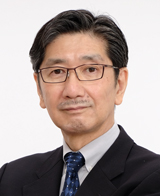About JSOT / President's Message
Message from the 16th President of the Japanese Society of Toxicology
 It is my great honor to be re-elected as the 16th President of the Japanese Society of Toxicology (JSOT).
It is my great honor to be re-elected as the 16th President of the Japanese Society of Toxicology (JSOT).Toxicology is a multidisciplinary complex of pure science, applied science, and social science, all working together to reveal the mechanisms and outcomes of biological reactions caused by various foreign substances (xenobiotics) that enter the body through any means. It is especially important for toxicologists to study new substances created by modern civilization activities based on an idea that those substances may have the potential to increase our quality of life. The purpose of toxicology in modern life is to predict the toxicity of such substances and let both producers and users find ways to prevent harm before it happens. The ultimate goal of toxicology is “human safety,” which includes all elements of the environment.
When I served as the 12th JSOT President in 2012, Japan was still recovering from the severe damage caused by the March 2011 earthquake and the remains of the subsequent radiological problems. The relationship between risk assessment and risk management, the differences between the risk to the population estimated by the authorities versus the risk levels felt by individuals, the contrasts between “safety myths” and reality, and “zero-risk” and “safety and security,” and the issue of low-dose hormesis, were topics confronting the field of toxicology. Relying on the article, Mission/Summary of the Society written by Prof. Hitoshi Endo, which indicated that JSOT matured by joining scientists from academia, industry and government, I proposed we take the important next step to enhance collaboration with scientists in the fields of medicine and social science. Thanks to the understanding and great cooperation of JSOT members and as an outcome of enhanced collaboration with medicine, our success was realized by the exchange of a Memorandum of Understanding with the Japanese Society of Clinical Toxicology (JSCT, 2014). Since then, JSOT and JSCT have held joint sessions during our annual meetings and we hosted our first joint (simultaneous) annual meeting in Osaka, 2018. The Journal of Toxicological Sciences (JTS) has been assigned as the English journal of the JSCT, and JSOT supported JSCT as a returning member to the International Union of Toxicology (IUTOX).
And this 16th Presidency is in the middle of COVID-19. Within the knowledge gained from the television coverages, COVID-19-related scientists have been positioned to bear responsibilities for the governmental risk management, against our understanding that the scientists should have been in charge of risk assessment, i.e. transmission of information and its interpretation. Risk management should have been carried out by a person in different position. However, because they are “experts in this field” it seems that, once again, one person has forced to play two roles. The 84th Annual Meeting of the Japanese Circulation Society held a Memorial Meeting of Shinya Yamanaka, Kyoto University and Hiroshi Nishiura, Hokkaido University https://www.youtube.com/watch?v=BIinba7Rd58&feature=youtu.be (available until October 31, 2020), and these problems were pointed out at its beginning, from 2 minutes and 50 seconds to 7 minutes.
Many of us hope this will not be a trend in the field of toxicology, especially in the risk management of chemical substances. I remember a time in the distant past when I heard from a researcher who had reported on the carcinogenicity data of hydrogen peroxide, which prompted a serious threat from outside the scientific community.
According to the by-laws of the Japanese Society of Toxicology, "Article 2 (Purpose)
The Society conducts the following projects for the purpose of promoting and developing research in the study field of toxicology, (1) Hold academic meetings, (2) Publish journals, (3) Educate and certify toxicologists, and (4) Other business required to achieve the above objectives.”
Accordingly, “social activity of the JSOT” should preferably be promoted as a research activity. The Certification Program for Diplomates of the JSOT (DJSOT) is considered an important contribution to the general society, and a recently developed activity of the Health-based Guidance Value Committee is a new challenge for JSOT.
In an effort to keep these social initiatives separate from risk management activities, I would like to propose a novel research activity, called "Toxicology in Concert with Risk Management,” which is a discipline that organizes and adjusts toxicity information to allow the risk assessor’s intentions to be communicated to risk managers without discrepancies. This activity requires several steps involving basic research, applied research, and processes for how to put together the combined data.
In this context, The Education Committee is in the leading position by having set their future tasks to include: (1) revision of the JSOT toxicology text book, (2) preparation for the publication of monographs on basic and practical toxicological science, (3) revision of the Glossary of Toxicological Terms publication, (4) development of a toxicity evaluation value workshop (consulting with the Health-based Guidance Value Committee), and revision of the “Glossary of Terms” on the homepage. Of course the on-going close relationship JSOT enjoys with IUTOX, ASIATOX, SOT, KSOT, Science Council of Japan (Toxicology Subcommittee), JSOT subcommittee activities, and Partner Societies promote our programs and expand domestic and overseas collaborations, which are all important elements of our activities towards the realization of the novel social research initiatives.
Former President Dr. Kumagai built strong international relationships for JSOT and I intend to further promote social contributions in conjunction with the purpose of the JSOT, i.e. “promotion and development of the research in the study field of toxicology.”
July 28, 2020
Jun Kanno, President of the JSOT


